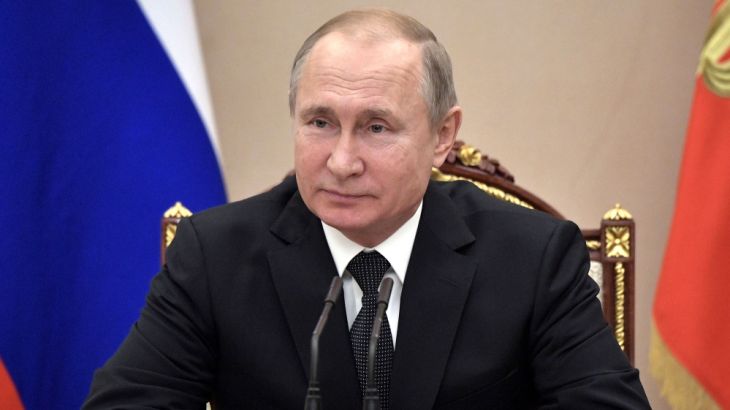‘Quid pro quo’: Russia suspends INF Treaty after US move
Vladimir Putin says Russia will abandon key nuclear arms treaty in a mirror response to US decision.

President Vladimir Putin says he will suspend Moscow’s participation in a Cold War-era Intermediate-Range Nuclear Forces (INF) Treaty after a similar move by the United States.
The landmark 1987 arms control pact, which rid Europe of land-based nuclear missiles, eliminated the medium-range arsenals of the world’s two biggest nuclear powers and reduced their ability to launch a nuclear attack at short notice.
Keep reading
list of 4 itemsRepublican congressman suggests nuking Gaza
UK’s Sunak to unveil $252m investment in nuclear deterrent, nuclear energy
Why are the US and Japan pushing to ban nuclear weapons in space?
Moscow and Washington have long accused the other of violating the agreement.
The Russian move on Saturday comes a day after the US announced it was suspending compliance with the INF treaty and gave notice of its intention to withdraw from the pact within six months over alleged Russian violations.
Accusing Moscow of breaching the treaty with “impunity”, US President Donald Trump said the US will “move forward” with developing its own military response options to Russia’s alleged deployment of banned cruise missiles that could target Western Europe.
“We will respond quid pro quo,” Putin said during a televised meeting with foreign and defence ministers, Sergey Lavrov and Sergei Shoigu.
“Our American partners have announced they were suspending their participation in the treaty and will do the same. They have announced they will conduct research and development, and we will act accordingly.”
The Russian leader instructed the military to work on developing new land-based weapons that were previously banned by the pact, but said Moscow will not increase its military budget for the new weapons.
He added that Russia would not deploy them in the European part of the country or elsewhere unless the US does so.
He also ordered ministers not to initiate disarmament talks with Washington, accusing the US of being slow to respond to such moves.
Fears of arms race
Signed by former US President Ronald Reagan and former Soviet leader Mikhail Gorbachev, the INF treaty banned ground-launched cruise missiles with a range between 500km and 5,500km.
As a result, American Cruise and Pershing missiles deployed in Britain and West Germany were removed, while the Soviet Union pulled back its SS-20s out of European range.
However, since 2014, US has accused Russia of breaching the INF accord by developing the SSC-8, a land-based, intermediate-range cruise missile also known as the Novator 9M729.
Russia denies the claim, saying the missile has a maximum range of 480 km.
|
|
US officials have also expressed concerns that China, which is not a party to the pact, was gaining a significant military advantage in Asia by deploying large numbers of missiles with ranges beyond the treaty’s limit.
On Saturday, China appealed to Russia and the US to preserve the INF treaty.
Urging Moscow and Washington to “resolve their differences through constructive dialogue”, Geng Shuang, spokesman for the Chinese foreign ministry said: “The US unilateral withdrawal may trigger a series of adverse consequences.”
Meanwhile, the collapse of the INF treaty has raised fears of a potential new arms race.
German Foreign Minister Heiko Maas tweeted on Friday that Russia was not prepared to restore confidence in the pact. “There will be less security without the treaty,” he said.
The French foreign ministry said in a statement that it regretted the US decision, but encouraged dialogue with Russia during the six-month period and consult NATO alliance partners.
NATO Secretary-General Jens Stoltenberg told the Reuters news agency that the alliance has no intention of moving new land-based nuclear missiles to Europe.
“We don’t have to mirror what Russia does,” Stoltenberg said.
“But at the same time, we have to make sure that we maintain credible and effective deterrence,” he added, without giving specifics on what the different military options NATO is looking at could entail.
Laura Rockwood, executive director at the Vienna Center for Disarmament and Non-Proliferation, called the treaty “extraordinarily successful” and said it “needed saving”.
“It would be best to keep the INF in place,” she told Al Jazeera.
“You don’t throw the baby out with the bathwater. It’s been an extraordinarily successful arms control treaty,” she said.
“There have been concerns over competition by China but perhaps the best way of addressing that is instead of scrapping the INF altogether, you try to engage China either on a trilateral basis or on a separate bilateral basis.”
Additional reporting by Zaheena Rasheed